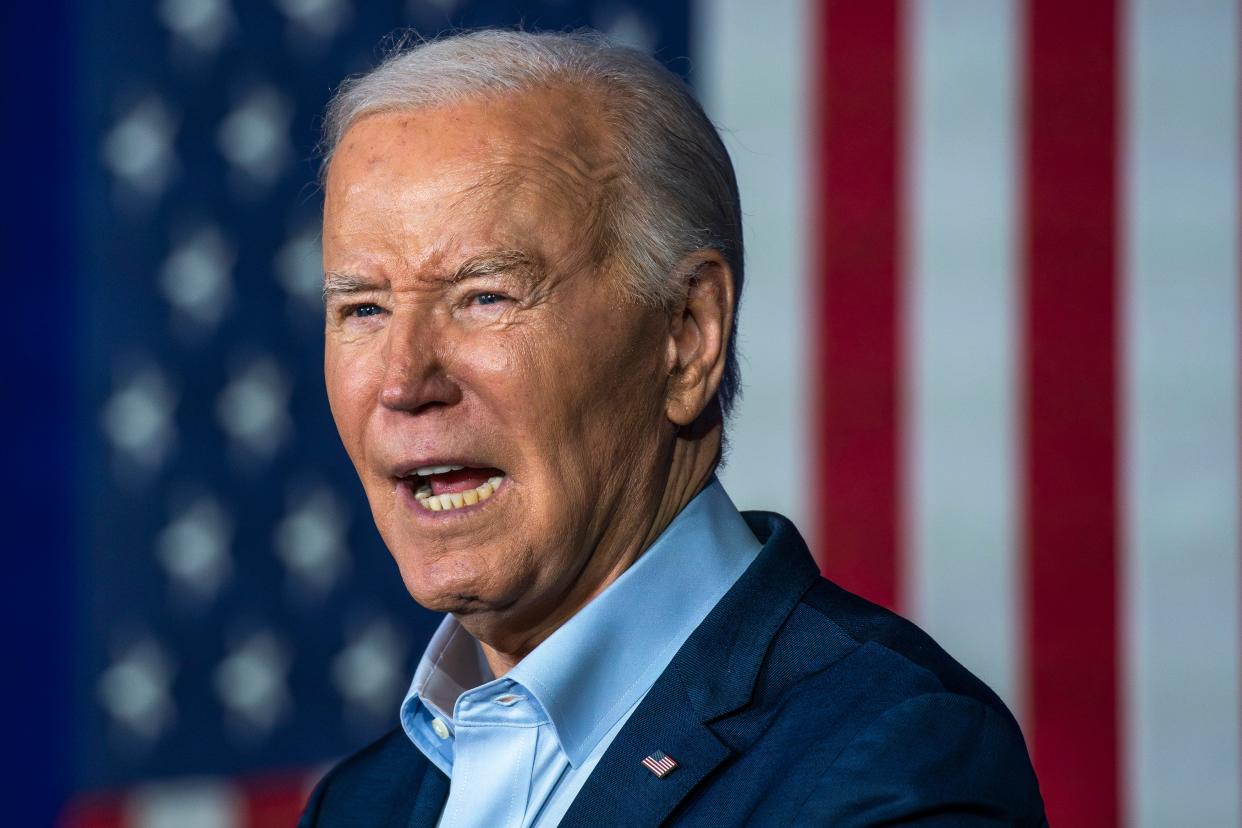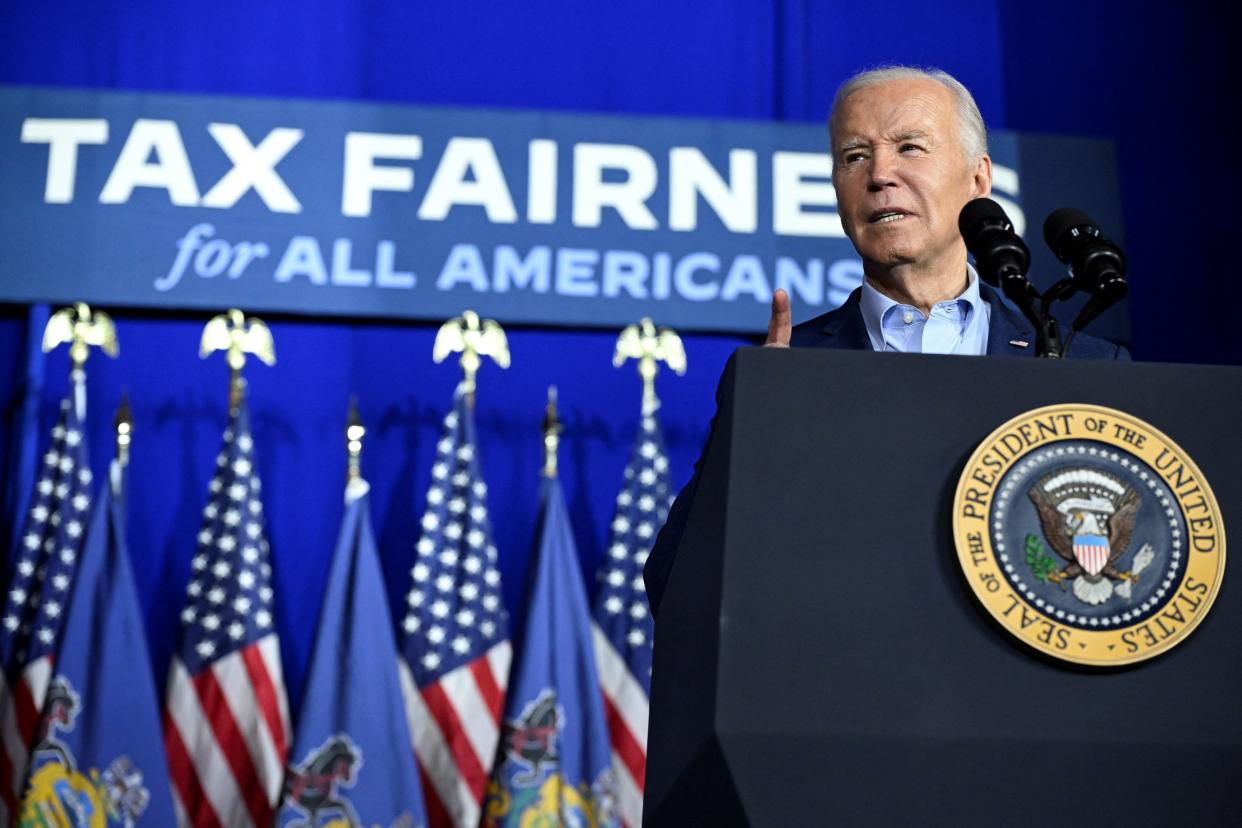President Biden moves to triple tariff rates on Chinese steel and aluminum
WASHINGTON – President Joe Biden threatened to triple the rates of tariffs on steel and aluminum from China amid pressure from labor unions concerned about the survival of the U.S. steel industry as Chinese exports flood the global markets.
Biden, during an address Wednesday to leaders of the United Steelworkers union in Pittsburgh, called on his United States Trade Representative, Katherine Tai, to consider tripling the existing 7.5% average tariff rate on Chinese steel and aluminum under Section 301 of the Trade Expansion Act to 25%.
"They're not competing − they're cheating. And we've seen the damage here in America," Biden said of China, adding that Pennsylvania and Ohio lost 14,000 steel jobs between 2000 and 2010. "Let me ask you: Are we going to let that happen again?"
"No!" steelworkers at the union's headquarters shouted in response.
With the move, Biden is borrowing from the trade playbook of former President Donald Trump, the Republican presumptive nominee, who routinely raised tariffs on Chinese goods during his four years in office.
Lael Brainard, the White House director of the National Economic Council, said China − which produces more than half the world's steel − is making more steel than the world can absorb, "flooding global markets at artificially low prices" and "undercutting American steel that is clean."
Production of Chinese steel isn’t subject to the same level of environmental regulation as the U.S. requires domestically.
"The president understands we must invest in American manufacturing, but we also have to protect those investments and those workers from unfair exports associated with China's industrial overcapacity," Brainard said. "China cannot export its way to recovery. China is simply too big to play by its own rules."

The higher tariffs would apply to Chinese steel and aluminum imports that aren't subject to a Trump-era 25% tariff still in place on certain steel imports under Section 232 of the Trade Expansion Act.
Imports of steel from China account for only about 0.6% of total U.S. steel demand, according to a senior Biden administration official. As a result, the White House does not believe raising the steel tariffs risks further increasing inflation, which has remained high despite recent economic gains.
Ahead of the November election, Biden and Trump are vying for support from working-class voters in Pennsylvania and other battleground states. In a related move, Biden is also directing the White House to work with Mexico to stop China's "evasion of tariffs" on steel and aluminum that are imported from Mexico to the U.S.
The United States Trade Representative will conduct an investigation into China's trade practices in shipbuilding following a petition by United Steelworkers alleging that China is pursuing aggressive non-market policies that have allowed it to dominate the global market.
"If that investigation confirms these anti-competitive trade practices, then I'm calling on (Tai) to consider tripling the tariff rates for both steel and aluminum imports from China," Biden said.
Still, Biden sought to distance himself from Trump's approach to tariffs. Biden said Trump is campaigning on "across-the-board tariffs on all imports from all countries that could badly hurt American consumers." Biden said Trump's tariff plan would cost the average American family an average of $1,500 a year.
"Trump simply doesn't get it," Biden said. "I'm not looking for a fight with China. I'm looking for competition, but fair competition."
The price of Chinese steel exports is about 40% lower than the price of U.S. exports. The higher tariffs are designed to provide a "more level playing field against China's unfair trade practices" and protect American jobs in the steel industry, a second Biden administration official said.
The U.S. steel industry has been rattled by the planned $14.9 billion sale of Pittsburgh-based U.S. Steel − an iconic American brand for more than a century − to Japanese-based Nippon Steel Corp.

Biden last month came out in opposition to the sale, which is under review by the Committee on Foreign Investment in the United States. The United Steelworkers union, which opposes the deal, endorsed Biden's reelection bid shortly after he announced his opposition.
"It should remain a totally American company: American-owned, American-operated by American union steelworkers, the best in the world," Biden said. "And that's going to happen, I promise you."
Biden's move on tariffs comes one week after Treasury Secretary Janet Yellen met with Chinese leaders in Beijing. Yellen said she relayed the U.S. is worried China's "weak household consumption and business overinvestment" pose "significant risk to workers and businesses in the United States and the rest of the world."
It is unclear when the higher Chinese steel tariffs would go into effect. U.S. tariffs imposed under Section 301 are nearing the conclusion of a statutory four-year review. Any formal action would follow the review.
This article originally appeared on USA TODAY: President Biden calls for tripling tariffs on Chinese steel, aluminum
